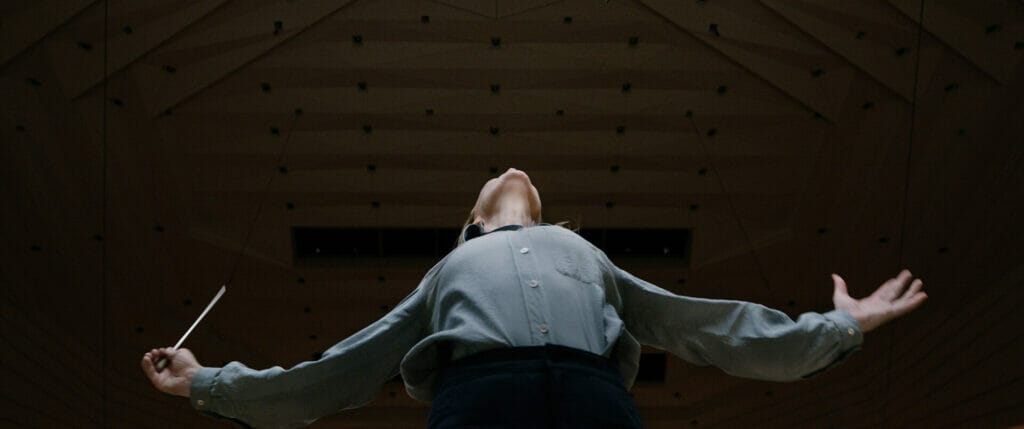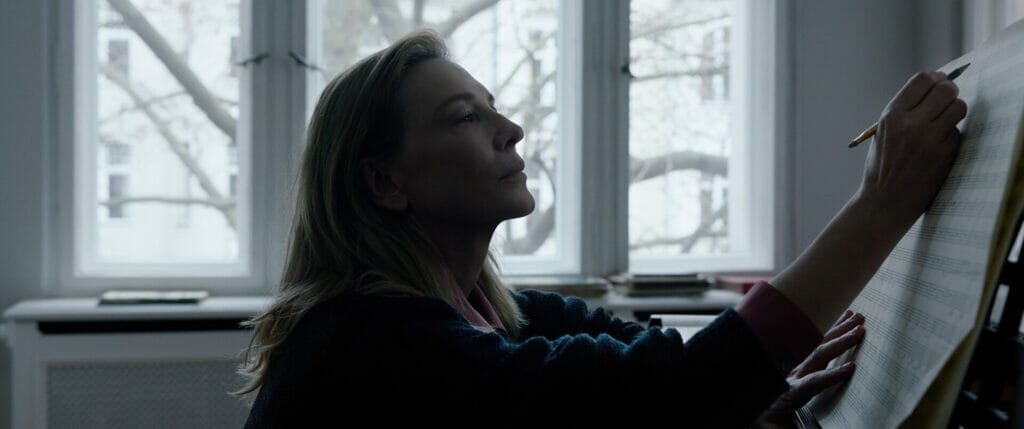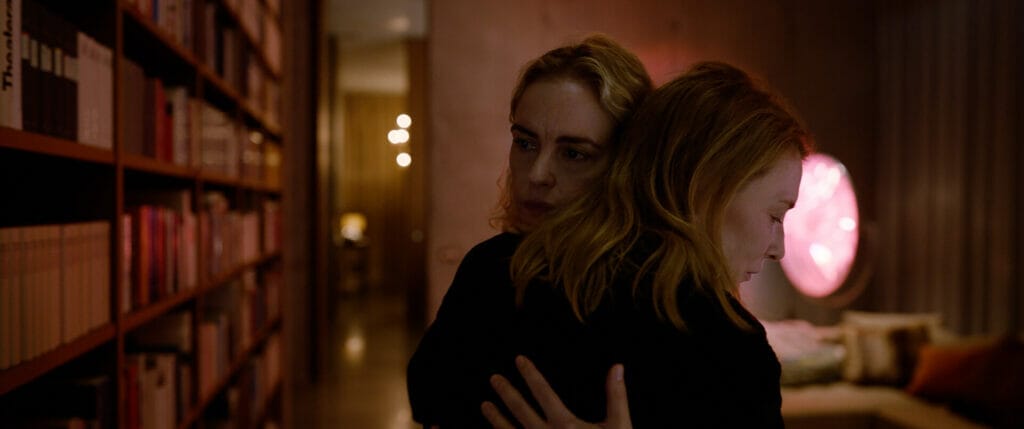Todd Field’s Muscular Filmmaking and Cate Blanchett’s Tour De Force performance harmonize to create a pitch-perfect meditation on art and fame
Tár’s opening sequence is the dangerous spark that preludes the wildfire. In this Ted-Talk-esque interview, we are introduced to the backdrop of a modern classical orchestra. We are introduced to Todd Field’s brilliance toward spatial direction. We are introduced to the beautifully desaturated, almost concrete, color correction. And finally, we are introduced to Lydia Tár, the famed Maestro whose brilliance translates to slight arrogance and unembellished honesty.
Under the mask of what feels like a boring interview, you will find perfectly laid out expository dialogue. I know, I know, “expository dialogue”, yuck! However, it’s cleverly hidden in a way where you don’t realize it was expository until the film calls back to ideas and attitudes that Lydia displayed during the interview. Similar to the grand orchestra in the film, Tár has all these invisible moving parts that, together, contribute to a moving and engaging art display.
Lydia, phenomenally performed by Cate Blanchett, possesses a clear insensitivity towards the times, strangers, subordinates, and even lovers. Her selfishness is more than a personality flaw, it’s the central command for our unfolding story of a famed figure’s downfall. The film indelibly presents itself as more than Field’s and Blanchett’s war against cancel culture– if anything, it’s the opposite. There is no revenge for Lydia. There is no wiggle room for Lydia’s career. There is no sympathy. In its two-and-a-half-hour runtime, not a single scene is wasted.

It’s been a while since a film has had an intense dedication to telling a story completely naturally and realistically. Tár’s central story rarely drives forward at its earliest convenience. The way Tár unfolds is meticulous and calculated but never sacrifices its strong integrity towards human interaction. Conversations don’t make shortcuts for the narrative, every character’s motivations are firmly established, and the film circles back on exposition in such a rewarding fashion.
Todd Field’s script is as brawny as it can possibly be, but it’s his roided-up direction that takes Tár’s story to otherwise unreachable heights. His collaboration with cinematographer Florian Hoffmeister feels like a collision of two like-minded artists creating something bold. From the shot compositions to the beautiful lighting, every scene exudes this palpable confidence. Though Field’s approach looks strategic and intentional, his method feels pragmatic and slightly spontaneous. The visuals feel just as restrictive as the script; revealing things when naturally warranted.
Field has this incredible ability to make intimate scenes within frighteningly large spaces. Toward the beginning of the film, we are met with a stunning long take that still boggles my mind. In what feels like a ridiculously gigantic lecture room, we watch Lydia’s ability to drive people away from her in real-time. Blanchett fills what might be the densest and most layered role she’s taken on since Blue Jasmine. She works this particular scene to complete perfection, navigating the ego of an arrogant, yet immensely gifted artist with tremendous realism.

She dominates every space she’s in, no matter how large. She’s magnetic in the sense that even though she is interacting with the students, she never leaves the sight of the camera. Though Oscars are awarded to the actors that can display emotion through tears and yelling (i.e. Rami Malek, Casey Affleck), I would love to see Blanchett win for her masterful arrogance and lack of empathy.
Many will be quick to notice how the film about a classical orchestra maestro doesn’t have a score. This decision yields some massively impressive sound design. The booming sounds of the orchestra rehearsal reverberate throughout your chest cavity. The ticks of everyday sounds eerily loom over Lydia’s paranoia. What you’d classify as background noise becomes an immersive decision that feels disorienting (in a brilliant, this-movie-is-a-goddamned-masterpiece type of way).

The ending arrives with a score piece of Lydia’s that closes the book in such a masterful way. It’s an exciting introduction piece that alludes to the idea that not only is one story ending, but another is beginning. Tár has one of the boldest endings this year has to offer. Our protagonist doesn’t find revenge or good fortune. She is simply left with no other choice but to carry on with the new circumstances in her life.
Instead of a tragic ending for a character that has done so much harm to those around her, there’s a glimmer of remorse in Blanchett’s final moments to the point where it becomes redemption. Field isn’t seeking sympathy for our character seemingly destroyed by the villainous “cancel culture”.
The film is a powerful character study before it is a layered fable on social phenomena. Tár holds up as a strong contender for my number one 2022 spot. I can only hope The Fabelman’s isn’t strong enough to write its best picture destiny in stone because Tár definitely deserves it.
Want to discuss things further? Hit us up on Twitter, Facebook, or Instagram. And for more film, gaming, anime, and TV news, trailers, and updates make sure to keep it locked right here at The Nerdy Basement. While you’re here, please consider supporting us on Patreon! It’s an easy way of supporting us so we can keep providing you with your Nerdy News!

